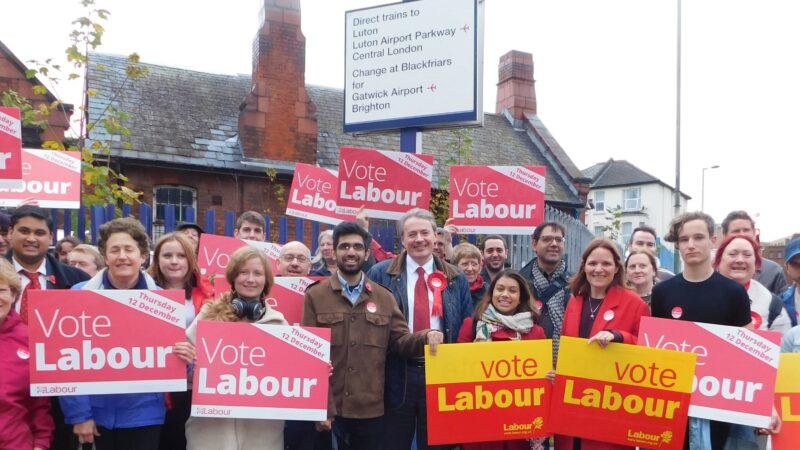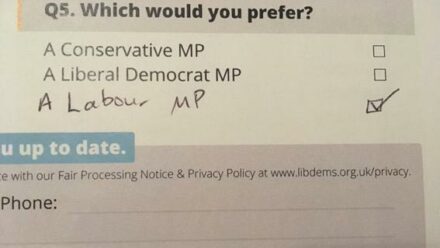
Ross Houston was selected last month as Labour’s candidate for the marginal seat of Finchley and Golders Green. He will be the fourth Labour challenger in as many general elections attempting to win back the seat since it was lost to the Conservatives in 2010.
Ross, who is also deputy leader of the Barnet Labour group and councillor for West Finchley ward, will go up against Tory incumbent Mike Freer and Luciana Berger, the ex-Labour MP now standing for the Liberal Democrats. It’s a tough ask, but Labour only lost in Finchley and Golders Green by 1,657 votes at the last election.
The new candidate faces a number of challenges at the election, the biggest of which is probably Brexit. From the outset, Ross makes clear in our interview that he thinks the fight in Finchley and Golders Green will ultimately come down to this one issue: “It’s a Brexit election,” he declares. “Brexit is a very important issue for me, and that’s why the members chose me.”
He is quick to outline his Remain credentials, recalling that he ran the Labour In campaign during the 2016 EU referendum in Barnet in 2016, and that he was “very much involved” with Stronger In. He has since set up a local group campaigning for a fresh referendum called ‘Finchley and Golders Green for Europe’.
“Labour is the People’s Vote party and it’s the only People’s Vote party,” Ross tells me. He thinks the alternatives to Labour aren’t good enough: it’s a Tory no-deal or hard Brexit, or Jo Swinson’s “self-serving and reckless” proposed revocation of Article 50. “I have Leave-voting friends,” he explains, “and all the Lib Dem policy will do is enrage and disenfranchise Leave voters and drive them towards the Brexit Party. It will be an absolute boost to Nigel Farage.”
He adds: “I find it astonishing that a party that doesn’t believe in first-past-the-post would choose to overturn a national referendum on the basis of a first-past-the-post victory. I find that astonishing, and the precedent it sets is that if the Tories and the Brexit Party get in they can just implement no deal Brexit without going to the people again.”
Ross is clear: “The only sensible position is the Labour one, which is to have a public vote with Remain on the ballot.” And in that referendum, he would unambiguously campaign for Remain, along with high-profile figures such as Keir Starmer and John McDonnell who have already declared their intentions unlike Labour leader Jeremy Corbyn.
Finchley and Golders Green voted almost 70% for Remain in 2016. In this strongly pro-Remain seat, however divisive for the country as a whole, could the Lib Dem policy be going down well on the doorstep? Ross doesn’t seem worried. Maintaining that the Lib Dem policy wouldn’t stand up to scrutiny, he replies: “I think the more that the election goes on, the more that will be exposed. Everyone knows someone who voted Leave, even in north London, everyone knows someone who voted Leave… It doesn’t give you closure on Brexit – it gives you years ahead of conflict.”
The Lib Dems, Green Party and Plaid Cymru have recently agreed a pro-Remain pact. The so-called ‘Unite to Remain’ alliance will see the three parties put forward just one candidate in 60 seats, in an attempt to ensure that just one Remain candidate stands in each constituency. But they have chosen a number of seats with strongly pro-Remain Labour candidates – including Finchley and Golders Green.
Ross brands the proposal “ridiculous”. He says: “It’s ridiculous in a constituency where there is a Remain candidate that is 1,600 votes behind Mike Freer. It is absolutely ridiculous because all you will do is let Mike Freer back in. You will not get a Lib Dem MP, I don’t think, in this constituency. There is too big a gap to jump.”
As a seat with a large Jewish community, another challenge for the new candidate will be the difficulties that Labour’s disciplinary process has faced in relation to reports of antisemitism in the party. The seat lies in London’s ‘bagel belt’ with an estimated one in five voters being Jewish.
Labour needs an independent complaints process, Ross argues, in order to restore the trust lost between the Jewish community and the party. This wouldn’t go for antisemitism complaints alone but all equalities-related issues, he clarifies.
The Jewish Labour Movement has decided not to campaign for Labour candidates “unless in exceptional circumstances and for exceptional candidates” – and only in Labour-held seats. Has this move made an impact on his campaign? Ross points out that JLM members will campaign individually in Finchley and Golders Green anyway. He adds: “I completely accept the rationale for them concentrating resources where they’ve got MPs who’ve been very supportive of them.”
Ross is understanding of the JLM move, but that is not to say his task isn’t a very tough one. Both the Tories and Lib Dems are targeting Finchley and Golders Green. That is the case in the other so-called bagel belt constituencies – Hendon and Chipping Barnet, where Labour by just 1,072 and 353 votes respectively. But Ross has an additional challenge, specific to his seat in particular.
The new candidate is standing against Luciana Berger in the north London seat, who resigned from the Labour party in February this year citing antisemitic abuse. She left to form the Independent Group initially, which then morphed into Change UK before she resigned from the new party in June 2019. In September, she joined the Lib Dems and has chosen to stand in a seat where Labour were just 1,657 votes from beating the Tories in 2017.
Commenting on Berger’s departure from the Labour Party, Ross says: “I think it’s a matter of great regret that Luciana felt she had to leave the party after appalling abuse, which should never be allowed to happen again.” He reaffirms his view that the party needs an independent complaints process.
But Ross does express frustration at the famously misleading campaign tactics that the Lib Dems have been employing, and expresses worries about some of the materials they’ve been distributing to residents in the marginal seat.
“The Lib Dems sent out a questionnaire that said ‘would you prefer a Tory MP or a Lib Dem MP?'” Ross reports. “It didn’t mention Labour, so your only choices were Lib Dem or Conservative, and you can bet your bottom dollar that the result will appear on a Lib Dem leaflet as a poll saying they’re ahead.”

Despite these challenges, Ross is hopeful about his chances and says he has strong support from across the party. He explains he’s getting lots of support from across the party and isn’t particularly worried about a suppressed vote in this chilly election. He tells me: “I don’t get the impression that people anymore than any other election are less likely to vote… In fact, I find that people are quite engaged in one way or the other in the election.”
The candidate is positive about his chances throughout our conversation but expresses the seriousness of the challenge on his hands, saying: “In a three-way split, anything can happen.”




More from LabourList
Nudification apps facilitate digital sexual assault – and they should be banned
Diane Abbott suspended from Labour after defending racism comments
Labour campaign groups join forces to call for reinstatement of MPs